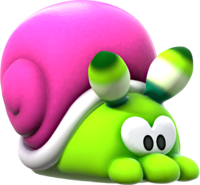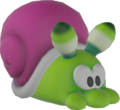Swirlypod: Difference between revisions
No edit summary |
Ketchupcat (talk | contribs) No edit summary |
||
| Line 26: | Line 26: | ||
|ItaM=Pun on "chiocciola" (snail) | |ItaM=Pun on "chiocciola" (snail) | ||
}} | }} | ||
==Trivia== | |||
*The snails' bulbous, striped antennae strongly resemble the [https://en.wikipedia.org/wiki/Leucochloridium_paradoxum green-banded broodsac], a parasitic flatworm that infests the eyestalks of snails. | |||
==Refereneces== | ==Refereneces== | ||
<references/> | <references/> | ||
Revision as of 19:57, November 17, 2023
This article is about a subject in an upcoming or recently released game. When the game is released, or more information about this subject is found, this article may need major rewriting.
This notice should be removed after a month has passed since the game was first released.
| Swirlypod | |||
|---|---|---|---|
 Rendered game model of Snail | |||
| First appearance | Super Mario Bros. Wonder (2023) | ||
| |||
| |||
Snails are enemies from Super Mario Bros. Wonder that are introduced in the level Bulrush Coming Through!
They are green snails with a pink shell. As snails, they move slowly both on the ground, on the sides of a pipe and on floating blocks, but some are also seen climbing up background walls of Semisolid Platforms front side. When stomped, they are launched out of their shells, much like Beach Koopas, and, after recovering from the dizziness, attempt to get back in it. When Snails are eaten by Maw-Maws, their shells are spat out. Similar to Koopa Shells, their shell can then be picked up and used as a weapon or projectile against other enemies.
They are more prominent in the level Swamp Pipe Crawl, where the emerging pipes reveal they can withstand the poison without repercussion.
Big variants also appear in some levels with them with the same characteristics.
Gallery
Names in other languages
| Language | Name | Meaning | Notes |
|---|---|---|---|
| Italian | Kiocciola[1] | Pun on "chiocciola" (snail) |
Trivia
- The snails' bulbous, striped antennae strongly resemble the green-banded broodsac, a parasitic flatworm that infests the eyestalks of snails.
Refereneces
- ^ Swamp Pipe Crawl's Italian name: "Kiocciole sui tubi paludosi"

